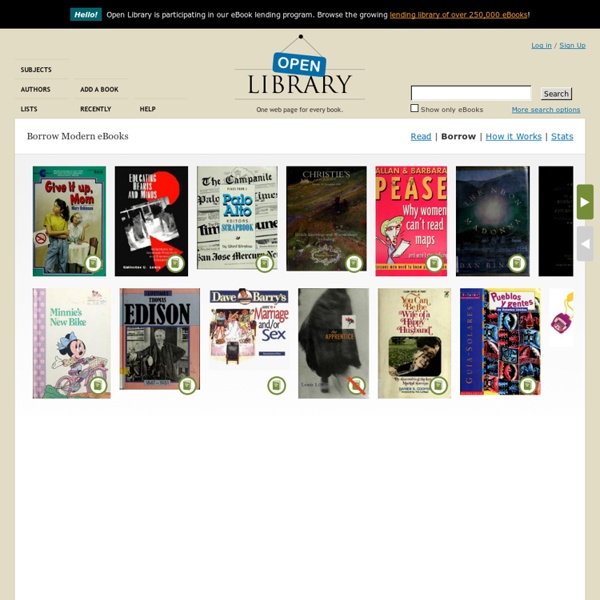5 e-Book Collections with Over 100,000 Free e-Books
Now that we have so many devices that enable us to read e-Books with ease, even those who were initially skeptical have now jumped on the e-Book bandwagon. Whether you have an iPhone, Kindle, Nook, or smartphone — or you’re a student at a college offering free laptops and iPads — you will find free e-Books which are compatible with your device on these websites. Here are 5 e-Book collections which contain over 100,000 free e-Books: BookRix Over 95,000 new books written by the community’s 371,000 members are available on BookRix for free. They also offer foreign language and audiobooks.ManyBooks.net Over 29,000 free eBooks are available for the Kindle, Nook, iPad and most other eReaders on Manybooks.net. Thousands of free titles are available at Mobipocket in the genres of English, American, and Germanic Literature, Romance and Children’s Lit, and non-fiction genres such as World History. and of course… And if these still aren’t enough, check out these posts for even more e-Books!
Metaphors and Threshold Concepts for Research — Katie Day
I asked the audience at Research Relevance to suggest new metaphors -- and here are some responses: a search engine like Google is like "trail mix" - returning results include some M&Ms, some raisins, some peanuts - while a database is like a whole bag of M&Ms -- all good resultsa group project is like a music quartet - each contributing to the whole beautiful sounda database is like a bathtub filled with water for a particular size and purpose, while Google is like a river, whose flow is unpredictable and aimless I particularly like (the dead white male professor) Kenneth Burke's description of the metaphor of the "unending conversation" of academic discourse -> "Imagine that you enter a parlor. You come late. Debbie and Sue spoke about giving students three information sources in three different arenas: e.g., a tweet, a newspaper, and a journal -- by the same author (e.g., Michael Kraus). I caution students that their biggest danger is not finding the (right?
Natural Cures for Eczema
Eczema is a skin disorder that causes swelling, redness and dryness of the skin. This inflammatory skin condition is marked by severe itching and commonly occurs on the cheeks, forearms, necks and the legs. Although there are different ways to treat eczema, the home remedies listed below can heal eczema naturally, without causing any side effects. Coconut oil, when applied on the affected area is found to be useful to cure eczema naturally. Herbal creams and gels are also effective in reducing symptoms of eczema. Direct exposure to sunlight, which is a great source of vitamin D, can also destroy the harmful bacteria responsible for causing eczema. Neem Oil for Eczema Neem oil can also heal eczema naturally. Vitamin E oil can also contribute to improve eczema greatly. In order to soften dry skin, you can take a bath with oatmeal mixed with water. Dietary Supplements Along with the topical treatments, certain dietary supplements can also be helpful in the treatment of eczema.
100 Extensive University Libraries from Around the World that Anyone Can Access
Universities house an enormous amount of information and their libraries are often the center of it all. You don't have to be affiliated with any university to take advantage of some of what they have to offer. From digital archives, to religious studies, to national libraries, these university libraries from around the world have plenty of information for you. Digital Libraries Capturing images of manuscripts, art, and artifacts, digital libraries are an excellent way of both preserving the past and sharing it with everyone. Harvard University Library. International Digital Libraries These digital libraries either have a focus on a culture other than that of the United States or are housed in another country. The Digital South Asia Library. Texts These libraries offer books or texts for you to read online and free of charge. Universal Digital Library. Medical Libraries These libraries offer medical information for both the professional and the lay person. Welch Medical Library. Legal Libraries
Introduction to Cooperative Learning
An Overview Of Cooperative Learning David W Johnson and Roger T Johnson Without the cooperation of its members society cannot survive, and the society of man has survived because the cooperativeness of its members made survival possible…. (Ashley Montagu, 1965) How students interact with each another is a neglected aspect of instruction. In the mid-1960s, cooperative learning was relatively unknown and largely ignored by educators. Definition of Cooperative Learning Students’ learning goals may be structured to promote cooperative, competitive, or individualistic efforts. Cooperation is working together to accomplish shared goals. Theorizing on social interdependence began in the early 1900s, when one of the founders of the Gestalt School of Psychology, Kurt Koffka, proposed that groups were dynamic wholes in which the interdependence among members could vary. Types Of Cooperative Learning Formal Cooperative Learning 1. 2. 3. 4. Informal Cooperative Learning 1. 2. a. b. c. d. a. b. c. d. e.
Libros electrónicos para todos - Leer en Pantalla
school-library-guidelines.pdf
Pixel Qi - See our Blog for latest about Pixel Qi
Library
As of July 1, 2013 ThinkQuest has been discontinued. We would like to thank everyone for being a part of the ThinkQuest global community: Students - For your limitless creativity and innovation, which inspires us all. Teachers - For your passion in guiding students on their quest. Partners - For your unwavering support and evangelism. Parents - For supporting the use of technology not only as an instrument of learning, but as a means of creating knowledge. We encourage everyone to continue to “Think, Create and Collaborate,” unleashing the power of technology to teach, share, and inspire. Best wishes, The Oracle Education Foundation
G'Day Math
Free ebooks by Project Gutenberg



